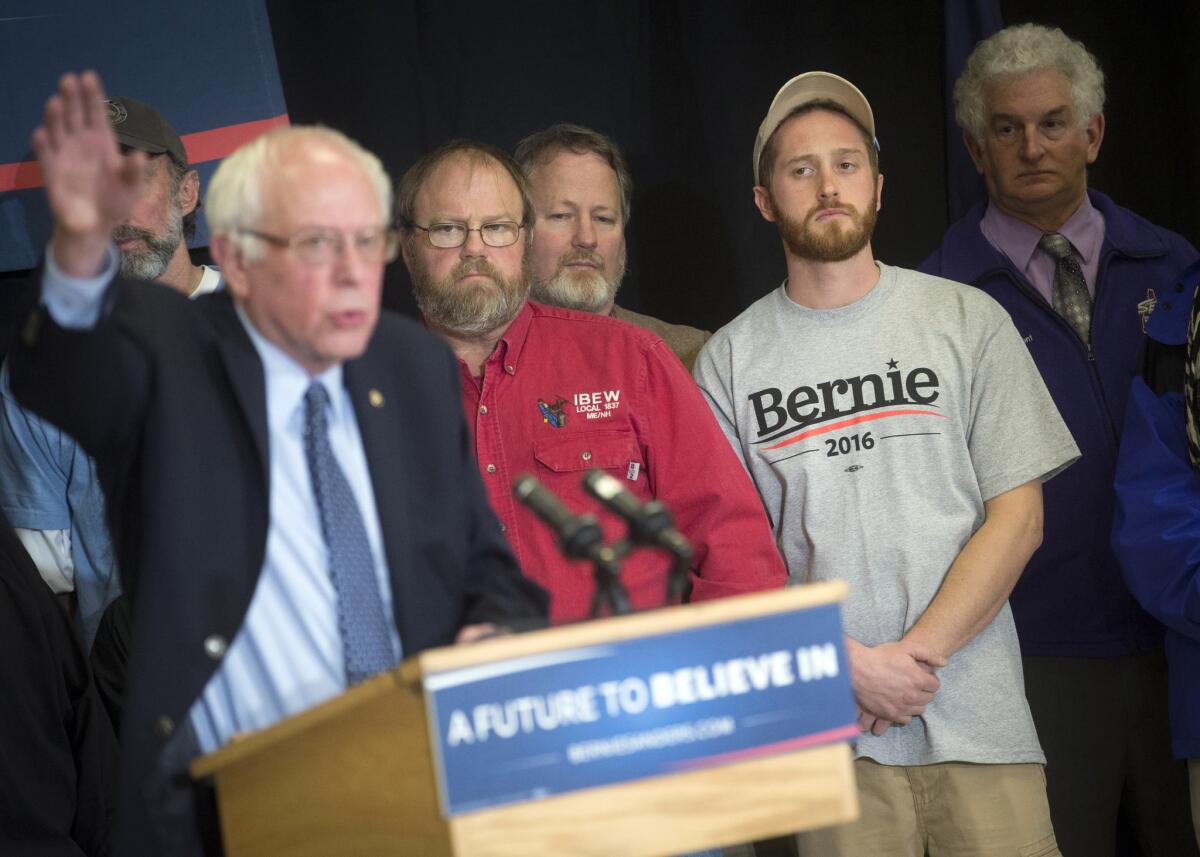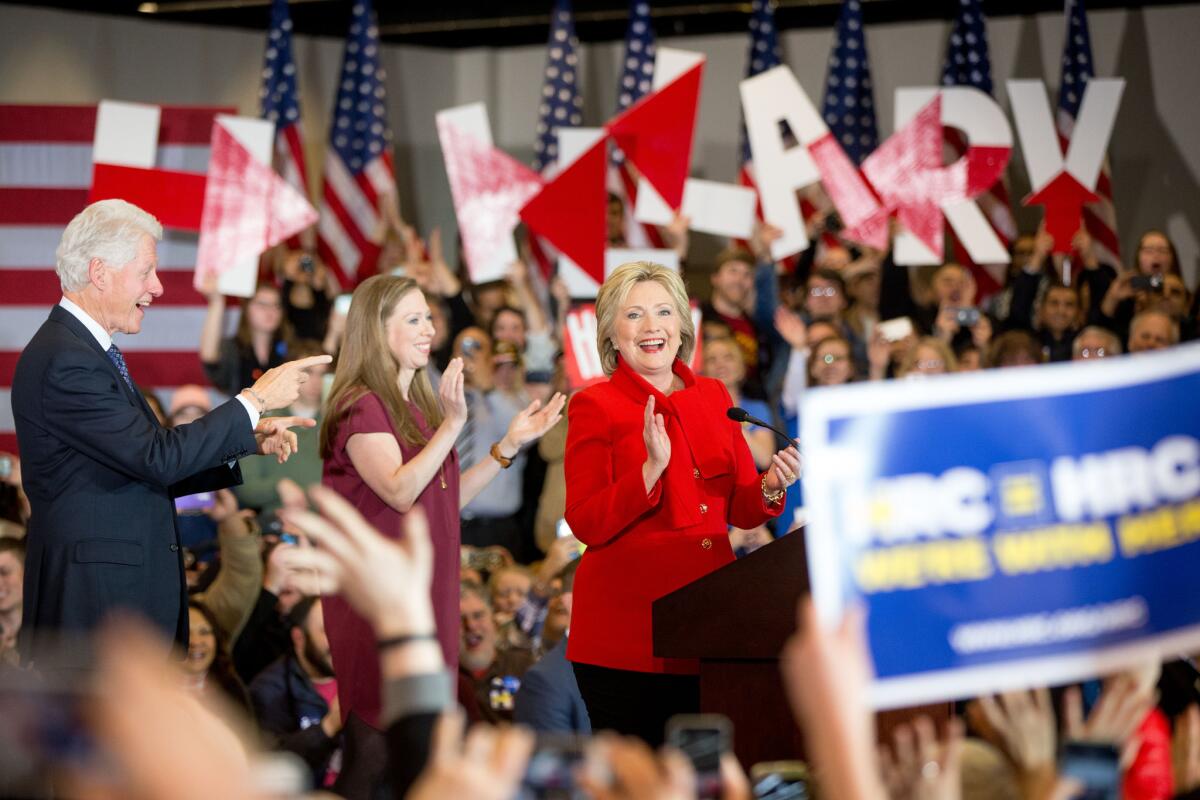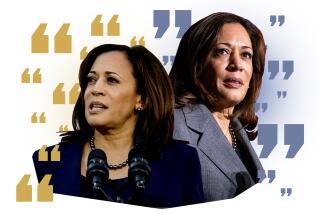Who’s a real progressive? Sanders and Clinton make their cases at New Hampshire town hall

Sen. Bernie Sanders campaigns in New Hampshire.
Reporting from Derry, N.H. — Eager to regain lost ground with voters here, Hillary Clinton pivoted off stepped-up attacks on her record by rival Bernie Sanders into a forceful defense of her progressive credentials.
Clinton’s push to define her record on her own terms, and to persuade voters she has done substantially more than Sanders to advance the legacy of progressives, dominated a nationally broadcast town hall here Wednesday and set the tone at campaign events leading up to it.
While still considered the front-runner nationally, the former secretary of State is trailing by double digits here in several recent polls — in part a reflection of what Clinton called New Hampshire’s “neighborly” spirit toward Sanders, a senator from Vermont.
“I was somewhat amused today Sen. Sanders set himself up to be the gatekeeper on who is a progressive,” Clinton said at the town hall during which she and Sanders fielded questions separately.
By his definition, Clinton said, some of the nation’s politicians most admired by liberals would also not qualify, including President Obama and the late Sen. Paul Wellstone of Minnesota, who was a revered progressive voice in the Democratic Party.
“I don’t think it’s appropriate that if Planned Parenthood endorses me, or the Human Rights Campaign endorses me, they are thrown out of the progressive wing and put into the establishment,” Clinton said.
The town hall, broadcast by CNN, was a warm-up of sorts before the two candidates clash head-to-head at a last-minute debate scheduled in New Hampshire for Thursday night.
As Clinton’s campaign works to set expectations low in New Hampshire, cautioning a loss there would hardly be catastrophic, it is also furiously trying to lay the groundwork for a comeback in a state that is prone to big swings in voter opinion right up until voting day. About 100 campaign workers from Clinton’s headquarters in Brooklyn, N.Y., have been dispatched to New Hampshire to help.
Clinton found herself in a position largely unfamiliar to her this campaign: playing catch-up, with the narrative of the final week before New Hampshire’s Feb. 9 primary being driven by Sanders, who has lately been unrelenting in raising doubts about her record on liberal causes.
Sanders bluntly told town hall moderator Anderson Cooper that there were major issues on which Clinton is not progressive.
“I do not know any progressive who has a super PAC and takes $15 million from Wall Street,” he said. “That’s just not progressive.”
He then listed times when Clinton had to decide on key issues and she was not on the side of liberals, including her support for the war in Iraq and her initial reluctance to criticize an international trade deal reviled by organized labor.
“The key foreign policy vote of modern American history was the war in Iraq,” Sanders said. “The progressive community was pretty united in saying, ‘Don’t listen to Bush; don’t go to war.’”
But as Sanders accused Clinton of forsaking progressive values at times, he found himself asked by a septuagenarian woman in the audience to explain how his unyielding ideology was going to play in Washington, where nothing gets done without compromise. Sanders talked about his success in working with Republicans on legislation, but also suggested his agenda might require taking control of Congress away from Republicans, a heady goal.
Another voter in the audience reflected the anxiety of some Sanders supporters when he expressed skepticism that the senator was better equipped to defeat the Republican nominee in a general election. Sanders delivered an energetic rebuttal, pointing to the large numbers of new voters he is drawing to the polls, and noting Democrats win elections when turnout is high.
The town hall also touched on an issue Sanders rarely talks about on the campaign trail: his faith.
Sanders is Jewish, but has said he has little involvement with organized religion. Asked by Cooper whether faith plays a major role in his life, Sanders said it did.
“I would not be here tonight” running for president, he said, “if I did not have very strong religious and spiritual feelings.”

Democratic presidential candidate Hillary Clinton, accompanied by former President Bill Clinton and their daughter Chelsea Clinton, arrives onstage at her caucus night rally at Drake University in Des Moines, Iowa.
In describing his faith, Sanders steered clear of traditional theological issues and focused, instead, on social justice.
“My spirituality is that we are all in this together. When children are hungry, when veterans sleep out in the street, it affects me,” he said.
The 74-year-old senator was also asked whether his age would make it unlikely he has the endurance to serve more than one term. “Thank God I’m in good health,” Sanders said. “If I am fortunate enough to win the general election and we do well, yes, I would like to run for reelection.”
If elected, Sanders would be the oldest person to win the presidency in U.S. history.
Clinton, for her part, has been in this position in New Hampshire before. She came into the state behind in the polls in 2008 after losing to then-Sen. Barack Obama in Iowa. She proved resilient then, ultimately winning the state.
The town hall reflected the doubts of Democratic and independent voters she still has to overcome.
Voters’ questions to her were more pointed than those Sanders faced, including whether she would rule out future military interventions abroad — she would not — and how she could withstand the attacks to come from Republicans. Clinton struggled to explain the six-figure speaking fees she commanded from universities and corporate giants after leaving the State Department.
“Well, that’s what they offered,” she said of $675,000 she received from Goldman Sachs. When pressed, she said other former secretaries of State had received similar compensation, and insisted it didn’t influence her views on Wall Street reform.
Like Sanders, Clinton also addressed how she would deal with Congress. She said she had learned to take criticism from Republicans “seriously but not personally,” and would continue to work to maintain voters’ trust.
“I know that I have to really demonstrate as clearly as I can who I am, what I stand for, what I’ve always done,” she said. “I’ve always been guided by the same values, I’ve always listened to people, and I’ve always worked as hard as I could to produce results for people.”
Twitter: @evanhalper
More to Read
Get the L.A. Times Politics newsletter
Deeply reported insights into legislation, politics and policy from Sacramento, Washington and beyond. In your inbox three times per week.
You may occasionally receive promotional content from the Los Angeles Times.












